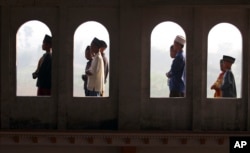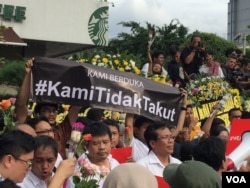Moderate Muslims in Indonesia say the country’s fight against terrorism and radical Islam must be conducted from the bottom up — in the streets and inside prisons — in a move away from the government’s current top-down approach.
Critics say Jakarta is moving too slowly to combat Islamic radicalism, with programs held back by bureaucracy. They say one area of particular concern is radicalism in the prison system.
Prison links
After a January 14 attack at a central Jakarta shopping mall killed at least four civilians and four gunmen, Indonesian authorities took more than 40 people into custody. Investigators linked the siege to an inmate still in prison.
According to Taufik Andrie, an Indonesia terrorism analyst, inmates who are spiritual or combatant leaders are still able to communicate to outside followers.
"In the context of spreading ISIS ideology, for example, the pattern is always the same: It came from inside the prison," Andrie said. Terrorist leaders' rules and orders or fatwa develop inside the prison, get out and are implemented outside.
Andrie added the Indonesian government has not yet improved the handling, placement and counseling of terrorist prisoners.
According to the Indonesia National Counterterrorism Agency, the state has custody of more than 200 inmates involved with terrorism, held in 49 prisons scattered among 13 provinces. The agency also monitors 538 former terrorist prisoners who have been released.
Andrie said that the agency's guidelines on de-radicalization efforts are limited to its own programs and that it lacks a mandate for interagency cooperation.
Grassroots
Since the Jakarta attack, the agency has been strongly criticized for inadequate attempts to rehabilitate convicted terrorists in and out of prison.
Nahdatul Ulama (NU), the country's largest Muslim organization, contends de-radicalization must be addressed at the grassroots level.
Its deputy secretary general, Adnan Anwar, told VOA the government’s approach is still too bureaucratic, limited to efforts such as seminars and accountability programs. He called upon the government to organize more dynamic face-to-face discussions.
Prevention
In the last two months, Indonesia’s government has had to deal with citizens wanting to go to Syria. It deported four young Indonesian men from Singapore; Indonesian immigration authorities later stopped 14 people.
The government needs to improve its prevention efforts and cooperation among institutions to confront terrorist dangers, Nahdatul Ulama's Anwar said.
The organization's members think "the radicalism movement in Indonesia has entered the red zone," he said. "We have told the government to deal with this, including taking action on the prevention level."
The Indonesian government has not yet directly addressed the criticisms of its approach to combating radicalism and terrorism.
But President Joko Widodo and the national parliament have agreed to strengthen the country’s anti-terrorism laws in a process that is underway.
A draft of the revisions includes laws to prohibit citizens from joining terrorist groups operating in conflict-ridden Iraq and Syria, and a ban on the return of citizens who went there to fight alongside Islamic State or other radical groups.
Looking ahead
NU has planned an international summit of moderate Islamic leaders May 9 to 11 in Jakarta to establish the contextual interpretation of jihad in the 21st century. It will attempt to disseminate tolerant teachings of Islam to counter the rise of extreme ideologies disguised as Islamic teaching.
To strengthen the terrorist fight, the Indonesian government last month installed Tito Karnavian as the National Counterterrorism Agency's chief. He previously led an elite police counterterror unit, which has had considerable success in tackling militancy. On his inaguration, Karnavian told the media that one of his priorities would be taking on terrorism in the Poso region of Central Sulawesi province, where members of the radical East Indonesian Mujahidin (MIT) have pledged allegiance to the Islamic State group.
A joint collaboration between Indonesia police and military, named Operation Tinombala, is still working in Poso to apprehend MIT militants.
Fighting against radical Islamists and terrorism has been a continuous effort for the Indonesian government since the 2002 Bali bombings that killed 202 people.






